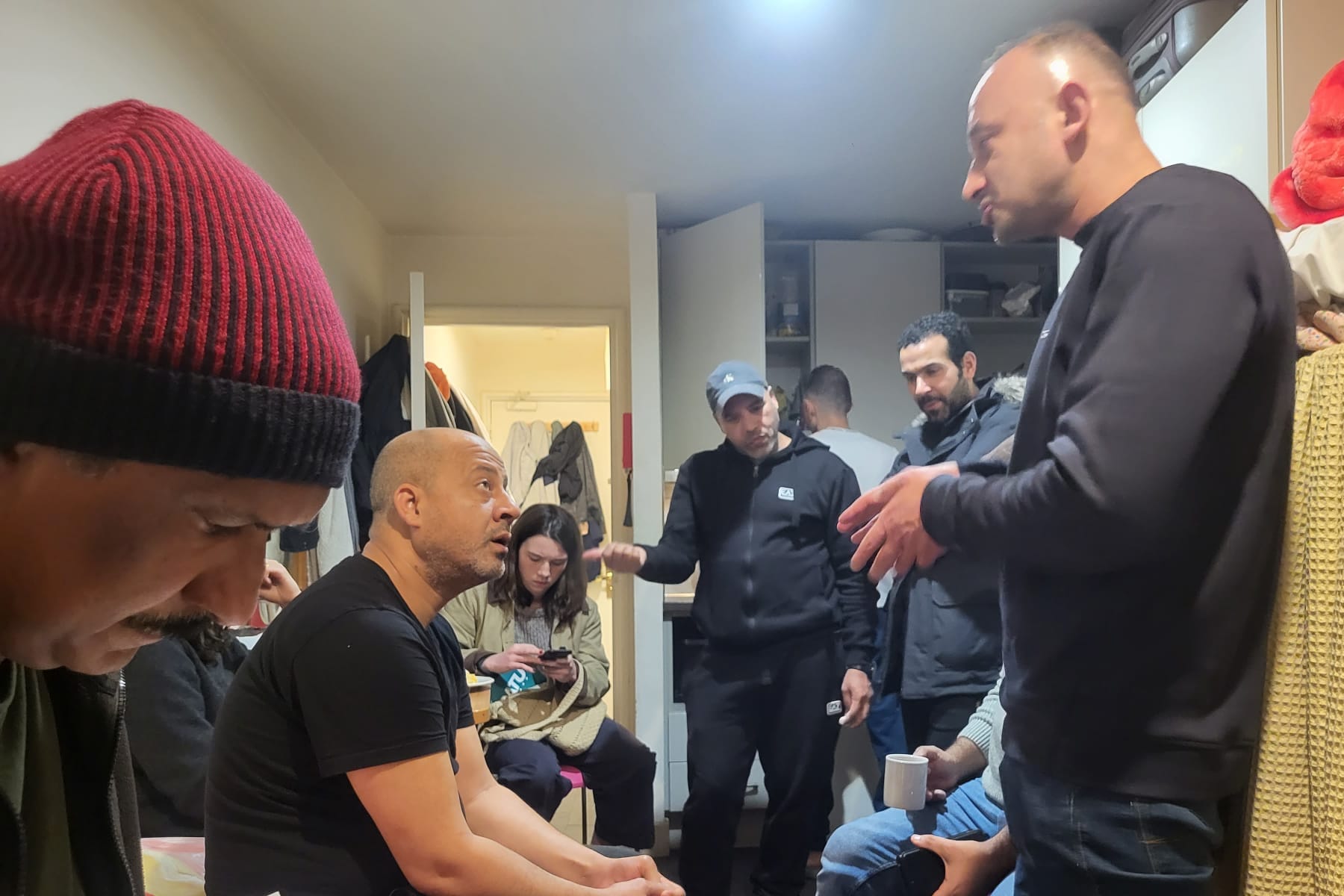What’s the best way to tell area residents about plans for a new asylum shelter nearby?
The government should tell communities directly about plans for new asylum shelters, some activists and politicians say.
“I consider this place home,” says Abdul Rahman Ali, who signed a lease for an apartment in the complex in 2010. “I’ve been here for 14 years.”

Abdul Rahman Ali says he has thought of himself as a long-term tenant in his home in Rathmines.
He has lived here for more than 14 years, after all.
He rented the flat in the Tramco building, a big block beside Lidl on Rathmines Road Lower in January 2010, shows a lease he signed with the estate agents at the time Lowe and Associates.
The building had been in receivership and over the years, it changed hands.
At one stage, after a rent hike, Ali moved to a different flat in the complex, he says. But he doesn’t remember ever getting a new lease.
So he was surprised in August this year when he received a “notice to vacate” from the current owners, Wellington Hospitality Limited – and when the notice called him a hotel guest.
It gave him until 12 November to leave.
“Three months is not enough,” says Ali, a tall man wearing a black jacket and a maroon hat. He was sitting on a bed in his neighbour’s studio flat.
He works in catering at Trinity College Dublin and has friends living nearby, he says. “I consider this place home.”
Along with 15 of his neighbours, who live in seven apartments in the building, he joined the Community Action Tenants Union (CATU).
They are challenging the evictions through the Residential Tenancies Board (RTB). But central to the case will be whether the RTB decides that they are tenants, with the rights that that brings – or hotel guests.
Planning records refer to the building as a hotel. The original permission, granted in 1997 for the building, was for an aparthotel with 51 rooms.
A 2018 planning application says there are “27 apart hotel suites and 39 conventional hotel rooms” in the block.
But Ali says it hasn’t operated as a hotel for at least the last 14 years, while he has lived there.
The Dublin Region Homeless Executive (DRHE) recently contracted the building, which it says is a hotel, for homeless accommodation, said a spokesperson on Tuesday.
“The DRHE contracted the property as vacant and was not made aware of any affected persons,” they said.
Being evicted from the private rental sector is a major driver of homelessness. It was the main route into homelessness for families in July, and the second most likely route for single people that month too, according to the most recent DRHE report.
Fekry Mansour has rented this studio flat in the building for three years, he says.
The renters have met with representatives of the landlord on multiple occasions since the notice to leave, says Mansour. But it’s not clear to him what the purpose of the meetings is, he says.
“Maybe five times we meet him, how many times Abdul?” he says to Ali who is sitting beside him.
His son Hossam is cooking in the background, on the hob in the small kitchen. Many of the remaining residents are from the same village in Egypt. Some are related to each other and they are working in Dublin as painters, he says.
Residents have pleaded to be allowed to stay because they cannot find other affordable accommodation, says Naeim Elshamy. “Every time, we are begging, can we stay? Please Malcolm, we don’t like to move. We are only seven flats left.”

Amelia Melanson, a local CATU member, says the union got wind of the eviction because a couple of existing members were affected.
They put letters under all of the doors in the building and recruited 15 new members, who are now contesting the eviction, through campaigning and RTB cases.
There used to be more people living in the Tramco building, says Melanson. But many have moved on.
“From the start, the residents of Tramco have acted as a collective, demanding tenancy rights not just for themselves but for their neighbours as well and this has made a real difference,” she says.
Recently, the landlord offered them alternative accommodation, says Ali.
But they are worried that if they move, they will be given a new lease which leaves them open to a no-fault eviction within the first six months, he says. “If you take the offer, you are gone.”
Residents voice other concerns too. One alternative was a big house with a kitchen shared by around 20 people, said Elshamy. At Tramco, each studio has its own kitchen.
Ali stands in his studio flat, surrounded by boxes and empty wooden shelves, where his collection of action figures used to be on display.
Of all the Batman, Marvel and Star Wars figurines, there was left just a black Darth Vader and a big white stormtrooper. “The toys, there are my precious things,” he says.
He boxed up his belongings when he got the notice in August, he says. He felt hopeless, he says, and didn’t know what to do.
Then, he got the letter that CATU members slipped under his door. “Then I thought – there is hope,” he says.
Ali had kept a copy of his original lease with Lowe & Associates on 25 January 2010. The lease is a fixed-term tenancy agreement which says that the Residential Tenancies Act 2004 applies.

If he is a tenant, he should have received a certain kind of eviction notice, showing on what legal grounds he was being evicted.
But he got a “notice to vacate”. “Please take this as formal notice that, as guests with the hotel, room 217 will need to be vacated no later than 12 November 2024,” it said.
Property records list the owner of the building as Wellington Hospitality Limited. Its directors are Sam Stuart and Susan Stuart, according to company records.
The notice to vacate was signed by Malcolm Stuart (manager). Malcolm Stuart didn’t respond to two phone calls, a text and an email sent Monday.
Experts in housing law couldn’t say for certain where the case will go in the RTB.
Gareth Redmond, a research and policy officer with Threshold, said that he hasn’t come across a case before exactly like this one. “It’s difficult to say what they would decide,” he says.
The RTB has issued guidance that gives some indication of the distinction between who is a tenant and who is, like guests in hotels, a licensee.
It says that for an agreement to be a licence arrangement it must be the intention of both parties that that is what it is. “The intention of the parties was for a licence agreement to be created,” it says.
Gavin Elliott, a barrister with experience in housing matters, said that the RTB usually finds that renters are tenants, especially in cases where they have exclusive occupation of their home.
Elliott says the adjudicators will look at all available evidence, including the planning permission and Ali’s lease. “If it looks like a tenancy, then the RTB will usually find that people are tenants,” he says.
Meanwhile, the DRHE recently launched its cold-weather strategy which, it says, focuses on opening new beds for those who are homeless over the winter months, to meet the growing demand.
Get our latest headlines in one of them, and recommendations for things to do in Dublin in the other.